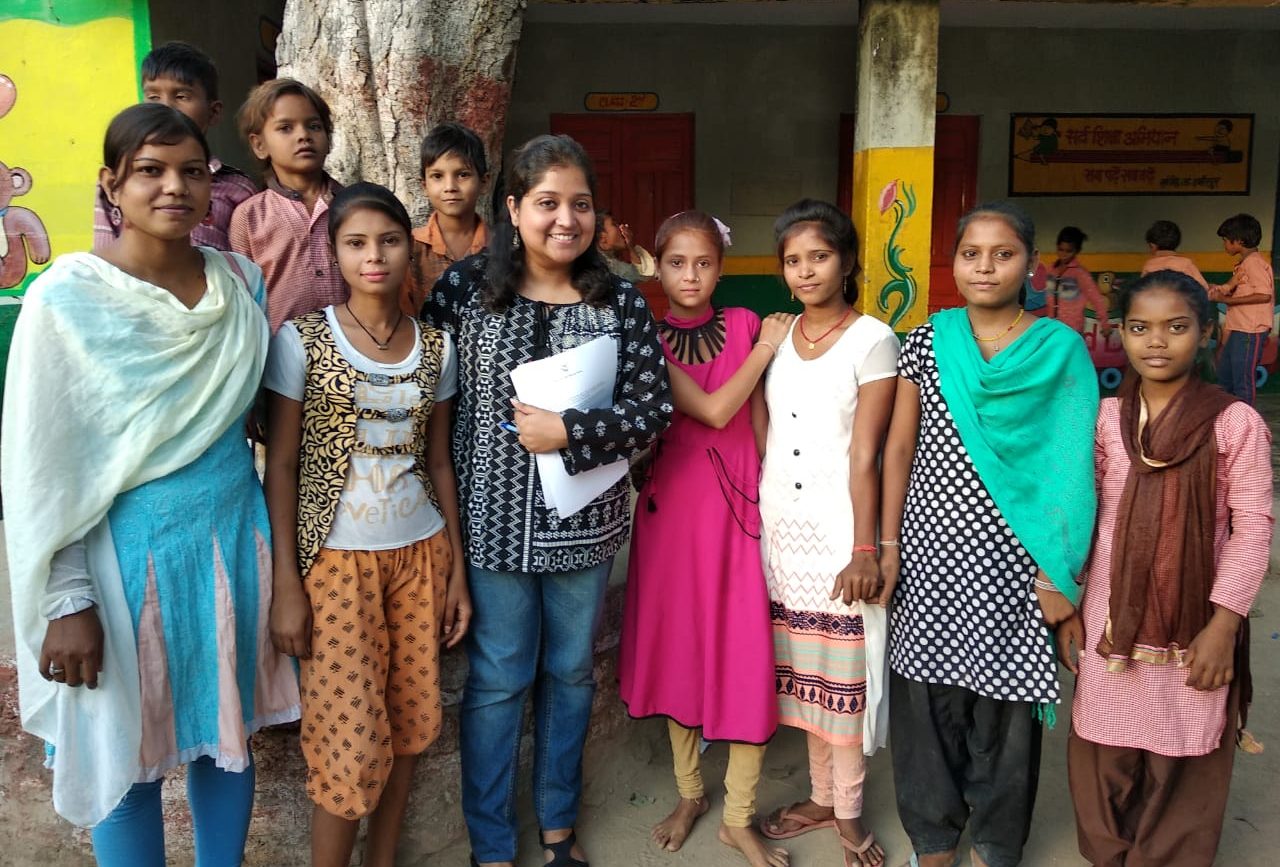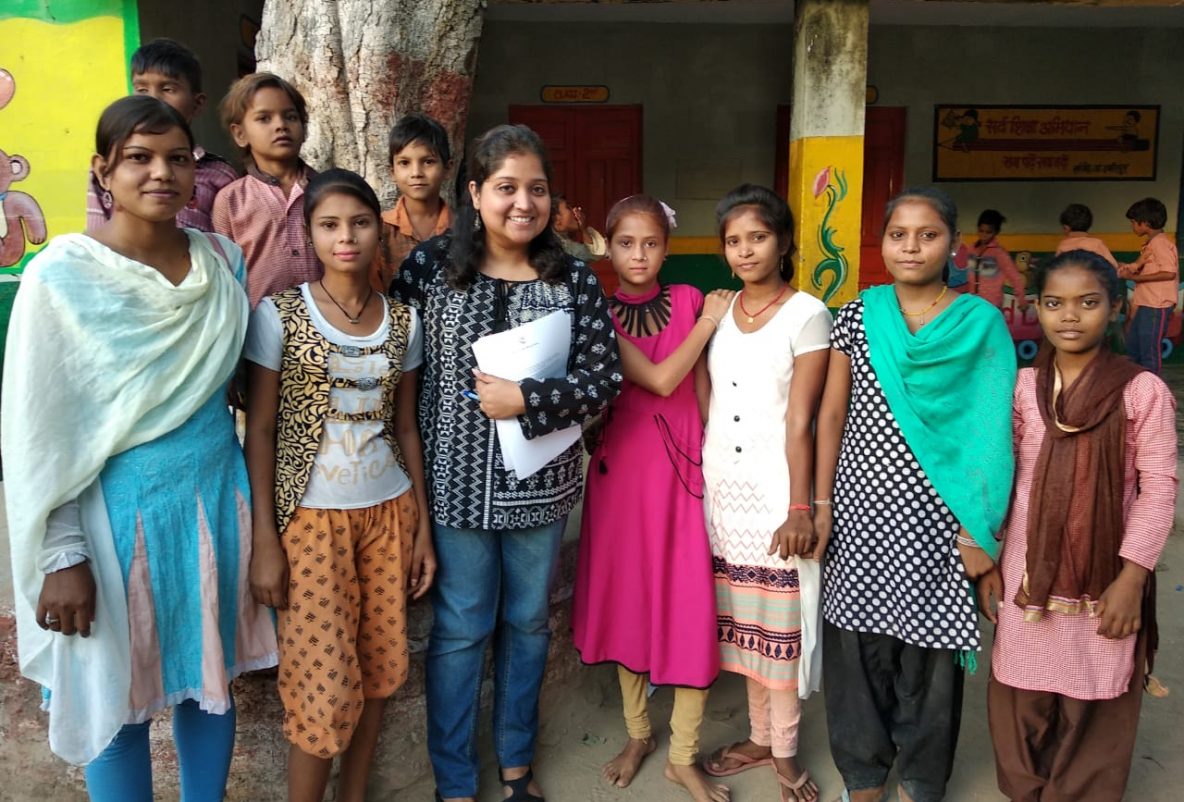
Rise Up Leader Srijita Majumder (center) in Hamirpur, Uttar Pradesh, India
Last year, Rise Up adapted our intensive in-person training curriculum to launch our first-ever virtual Leadership Accelerators. Over a six-month period, new Rise Up Leaders in India and Mexico came together online during challenging and unusual circumstances to develop their leadership and advocacy skills, build their networks, and create their own strategies to improve the lives of girls and women in their communities and countries. After the Accelerator, these Rise Up Leaders had the opportunity to apply for funding to launch those strategies and underwent a competitive selection process for seed funding to implement their strategies.
Today we are excited to share that we have awarded funding to eleven Rise Up Leaders in Delhi and the National Capital Region of India to implement their strategies to improve education, social justice, and economic opportunity for girls and women in Delhi and across India. These leaders are expanding girls’ access to education, making it easier and safer for women to participate in the workforce, reducing child marriage, making maternal, infant, and reproductive healthcare more accessible, preventing child exploitation and trafficking, and tackling the digital divide that disproportionately impacts women in India. Learn more about these grantees below.
Srijita Majumdar and Badar Uzzama, Council for Social Development
Srijita, Badar, and the Council for Social Development will increase access to education for adolescents across India by advocating to extend the National Right to Education Act to include children up to eighteen years of age. Currently, the legislation describes education as a fundamental right for children between ages six and fourteen. This disproportionately impacts girls, because more girls in India drop out of school after the age of fourteen than boys. Nearly 40% of Indian girls between ages 15 and 18 are out of school. This leaves girls at higher risk for child marriage, child labor, and early pregnancy. Srijita and Badar will organize girls, teachers, and civil society organizations to raise awareness among stakeholders about how the existing age criteria puts girls at risk and push to expand the Right to Education Act so that all adolescents in India can have access to education.
Chirashree Ghosh, Mobile Creches
Chirashree and Mobile Creches will improve childhood outcomes and health protections in Delhi by improving anganwadis, which are childcare centers in low-income communities established by India’s Integrated Child Development Services that also provide immunization for infants and prenatal care for mothers. The project will build greater community ownership of the childcare centers, provide more support to staff, and work with local government systems to fill gaps in service delivery by strengthening community-led support and monitoring groups to improve child care, immunization, and health care access.
Venu Arora and Noopur, Ideosync Media Combine
Venu, Noopur, and Ideosync Media Combine will increase educational and economic opportunities for women and girls by making digital and media literacy a core component in Delhi schools. A recent study showed that less than half of Indian women had ever used the internet and those numbers were even lower for women in rural communities. This digital divide makes it harder for women to earn a livelihood, express themselves, and access services; and the COVID-19 pandemic has only exacerbated this divide. Venu, Noopur, and Ideosync will create gender-sensitive digital and media literacy training to pilot in a program across ten schools in Delhi, with hopes of eventually scaling the program to all 1,030 Delhi government schools, so that girls throughout the state can more easily and safely navigate online spaces and better access educational and economic opportunities.
Vikram Srivastava, Independent Thought
Vikram and Independent Thought will protect girls and improve their wellbeing by strengthening laws and protections against child marriage across four states – Delhi, Haryana, Uttar Pradesh, and Rajasthan. Child marriage disproportionately impacts girls, depriving them of education, health, and safety. Despite legislation banning the practice, nearly 27% of girls in India are married before they turn eighteen. Vikram and Independent Thought will engage child protection stakeholders to collaborate to create more effective legal and judicial machinery to combat child marriage at the state level. They will also partner with NGOs to raise awareness about child marriage and increase the system’s accountability towards the protection of children so that girls in India can live healthier, happier lives.
Deepa Bajaj, Child Survival India
Deepa and Child Survival India will improve the health and safety of women and girls in Delhi’s informal settlements by increasing their access to gender-sensitive community toilets in informal settlement colonies. Currently, many women and girls in informal settlements avoid using community toilets because they often are unsanitary, poorly lit, lack privacy, and may expose them to harassment. Deepa and Child Survival India work with local authorities to ensure existing guidelines for making community toilets safe, accessible, and sensitive to women’s needs are better implemented. They also work with women and girls in the community to increase their capacity to monitor community toilets and establish connections with the Delhi Urban Shelter Improvement Board which provides services for community toilets.
Reena Banerjee, Nav Srishti
Reena and Nav Srishti will prevent child exploitation and trafficking in the state of Delhi by connecting child protection stakeholders, including the Child Protection Committees, the department of women and children, the police, the judiciary, and NGOs, to strengthen their collaborative response to missing and exploited children. They will form community networks to sensitize police to the various facets of child trafficking and ensure that existing laws to protect children from exploitation and trafficking are fulfilled, including the reporting, tracing, and rehabilitation of missing and exploited children.
Amrita Gupta, Azad Foundation
Amrita and the Azad Foundation will improve economic opportunity for women in Delhi by increasing the number of women drivers employed in the Delhi Transport Corporation bus services. Currently, women’s participation in the workforce in Delhi is well below the national average, and it has further decreased during the COVID-19 pandemic. Increased participation by women in the male-dominated transportation industry workforce will improve women’s opportunities for decent work and reduce barriers to mobility for women throughout Delhi by making public transportation safer for female passengers.
Riya Thakur, Population Foundation of India
Riya and Population Fund of India will expand sexual and reproductive health services in community clinics to help reduce child marriage, sexually transmitted diseases, and teen pregnancy and help increase agency among adolescents in Delhi’s informal settlements. They will identify the gaps in existing services, and then identify and support adolescent champions to raise awareness about their needs. Together, they aim to work with the local government to pass an order to ensure that clinics provide the sexual and reproductive health services needed to improve health and autonomy for approximately 500,000 adolescents in Delhi.
Suman Verma, Self-Employed Women’s Association (SEWA)
Suman and SEWA will create safer workspaces and more economic opportunity for women in the informal sector in Delhi by improving methods for reporting and addressing sexual harassment in the workplace. Despite laws in place to prevent it, workplace sexual harassment remains commonplace, particularly for women who work in the informal sector, who often have less information about their rights, and less recourse to address violations of those rights. Suman and SEWA will train women leaders on their workplace rights and support them to work with local officials to form local complaint committees and make it easier to report sexual harassment to the committee in their district.


